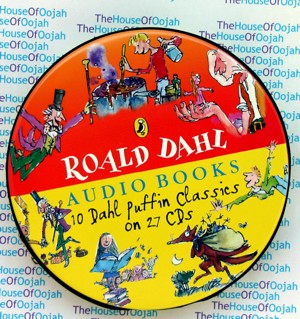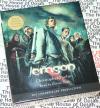The Roald Dahl AudioBooks 10 Classics on Audio Book CD
Stories Included : THE TWITS on 1 cd - MATILDA on 3 cds read by Simon Callow - GEORGE'S MARVELLOUS MEDICINE on 2 cds read by June Whitfield
DANNY THE CHAMPION OF THE WORLD on 3 cds read by Timothy West - CHARLIE & THE GREAT GLASS ELEVATOR on 3 cds read by James Bolam
THE BFG on 3 cds Read by Geoffrey Palmer- THE WITCHES on 3 cds read by Simon Callow - JAMES & THE GIANT PEACH on 2 cds read by Andrew Sachs - CHARLIE & THE CHOCOLATE FACTORY on 3 cds read by James Bolam
FANTASTIC MR FOX & OTHER ANIMAL STORIES on 4 cds read by Hugh Laurie, Stephen Fry and Martin Jarvis - RUNNING TIME APPROXIMATELY 26.5 HOURS
Brand New : 26.5 hours 27 CDs - some titles are abridged some are unabridged
Note: we only have a few remaining and they have slightly scratched tins. The CDs inside are all new and perfect.
Just some of Roald Dahl’s stories that are included:
Charlie and the Chocolate Factory:
Willy Wonka’s famous chocolate factory is opening at last!
James and the Giant Peach:
A little magic can take you a long way.
Fantastic Mr. Fox:
Nobody outfoxes Fantastic Mr. Fox!
About the Author Roald Dahl
After finishing his schooling he spent three weeks hiking through Newfoundland with a group called the Public Schools' Exploring Society. In July 1934 he joined the Shell Petroleum Company. Following two years of training in the UK he was transferred to Dar-es-Salaam, Tanganyika. Along with the only two other Shell employees in the entire territory, he lived in luxury in the Shell House outside Dar-es-Salaam, with a cook and personal servants. While on the job, supplying oil to customers across Tanganyika, he encountered black mambas and lions, amongst other wildlife.
In August 1939, as World War II was imminent, plans were made to round up the hundreds of Germans in Dar-es-Salaam. The fifteen or so British citizens in Dar-es-Salaam, including Roald Dahl, were made officers, each commanding a platoon of askaris of the King's African Rifles. Dahl was uneasy about this and having to round up hundreds of German civilians, but managed to complete his orders.
It was soon after this incident, in November 1939, that he joined the Royal Air Force. After a 600-mile car journey from Dar-es-Salaam to Nairobi, he was accepted for flight training with 16 other men, 14 of whom would later die in air combat. With 7 hours and 40 minutes experience in his De Havilland Tiger Moth he flew solo, and hugely enjoyed watching the wildlife of Kenya during his flights. He continued on to advanced flying training at RAF Habbaniya (50 miles west of Baghdad) in Iraq. Following six months of flying Hawker Harts he was made a Pilot Officer and assigned to No. 80 Squadron RAF, flying obsolete Gloster Gladiators. Roald Dahl was surprised to find that he would not be trained in aerial combat, or even how to fly the Gladiator.
On 19 September, 1940, Dahl was ordered to fly his Gladiator from Abu Suweir in Egypt, on to Amiriya to refuel, and again to Fouka in Libya for a second refuelling. From there he would fly to 80 Squadron's forward airstrip 30 miles south of Mersah Matruh. On the final leg, he could not find the airstrip and, running low on fuel and with night approaching, he was forced to attempt a landing in the desert. Unfortunately, the undercarriage hit a boulder and the plane crashed, fracturing his skull, smashing his nose in, and blinding him. He managed to drag himself away from the blazing wreckage and passed out. Later, he wrote about the crash for his first published work (see below). It was found in a RAF inquiry into the crash that the location he had been told to fly to was completely wrong, and he had mistakenly been sent instead to the no man's land between the British and Italian forces. Roald
Dahl was rescued and taken to a first-aid post in Mersah Matruh, where he regained consciousness, but not his sight, and was then taken by train to the Royal Navy hospital in Alexandria. There he fell in love with a nurse, Mary Welland, who was the first person he saw when he regained his sight after eight weeks. The doctors said he had no chance of flying again, but in February 1941, five months after he was admitted to the hospital, he was discharged and passed fully fit for flying duties.
By this time, 80 Squadron were at Elevsis, near Athens, Greece, and equipped with Hawker Hurricane fighting with the British Expeditionary Force in the Battle of Greece. He flew a replacement Hurricane across the Mediterranean Sea in April 1941, although he had only seven hours training on Hurricanes. By this stage in the battle for Greece the RAF had only 18 combat planes in Greece, 14 Hurricanes and 4 Bristol Blenheim.
He saw his first combat over the city of Chalcis, on April 15th shooting down a Junkers Ju-88. With his lone Hurricane against the six bombers that were attacking ships, On 16th April he claimed another kill as Probable. On April 20th Dahl took part in the Battle of Athens along with Squadron Leader 'Pat' Pattle and his friend David Coke, shooting down another Ju-88.
As the Germans were pressing Athens Dahl was evacuated back to Egypt.
80 Squadron was reassembled in Haifa, Palestine. From here, Roald Dahl flew missions every day for a period of four weeks, downing a Potez 63 on 8th june and another JU-88 on 15th June, but then he began to get blinding headaches that gave him black-outs in the air, and he was invalided home to Britain. At this time his rank was Flight Lieutenant.
He began writing in 1942, after he was transferred to Washington as Assistant Air Attaché. His first published work, in the August 1, 1942 issue of the Saturday Evening Post was Shot Down Over Libya, describing the crash of his Gloster Gladiator. He had been asked to provide some RAF anecdotes by C.S. Forester who had them published as propaganda. His original title for the work was A Piece of Cake - the title was changed to sound more dramatic, despite the fact that the crash had nothing to do with enemy action.
He ended the war as a Wing Commander.
Roald Dahl was married for 30 years (from 1953 to 1983) to Academy Award winning American actress Patricia Neal (The Day the Earth Stood Still, Hud, The Subject Was Roses, A Face in the Crowd). They had five children: Olivia, (who died of measles encephalitis at the age of seven), Tessa, (now an author), Theo, Ophelia, and Lucy.
When he was four months old, Theo Dahl was severely injured when his baby carriage was hit by a taxi in New York City. For a time he suffered from hydrocephalus: as a result his father became involved in the development of what became known as the "Wade-Dahl-Till" (or WDT) valve, a device to alleviate the condition.
In 1965, Patricia Neal suffered three burst cerebral aneurisms while pregnant with their fifth child, Lucy. Roald Dahl took control of her rehabilitation and she eventually relearned to talk and walk. They were divorced in 1983 following a very turbulent marriage, and he subsequently married Felicity ("Liccy") Crosland, to whom he was married until his death.
Ophelia Dahl is director and co-founder (with doctor Paul Farmer) of Partners in Health, a nonprofit organization dedicated to providing health care to some of the most impoverished communities in the world. Lucy Dahl, is a screenwriter in Los Angeles. Tessa's daughter (who was the inspiration for the "helpmate" character in her grandfather's book The BFG) is model and author Sophie Dahl who remembers him as "a very difficult man - very strong, very dominant ... not unlike the father of the Mitford sisters sort of roaring round the house with these very loud opinions, banning certain types - foppish boys, you know - from coming round."
Roald Dahl died of leukemia on 23 November, 1990, at his home, Gipsy House, in Great Missenden, Buckinghamshire, at the age of 74, and is buried in the cemetery at the parish church of St. Peter and St. Paul. According to his granddaughter, the family gave him a "sort of Viking funeral. He was buried with his snooker cues, some very good burgundy, chocolates, HB pencils and a power saw." In his honour, the Roald Dahl Children's Gallery was opened at Bucks County Museum in nearby Aylesbury.
Roald Dahl's charitable commitments in the fields of neurology, hematology and literacy have been continued by his widow since his death, through the Roald Dahl Foundation. In June 2005, the Roald Dahl Museum and Story Centre opened in Great Missenden to celebrate the work of Roald Dahl and advance his work in literacy.
Writing
Inspired by a meeting with C. S. Forester, Roald Dahl's first published work was Shot Down Over Libya, a story about his wartime adventures, which was bought by the Saturday Evening Post for 0 and propelled him into a career as a writer.
His first children's book was The Gremlins, about mischievous little creatures that were part of RAF folklore. The book was commissioned by Walt Disney for a film that was never made, and published in 1942. Dahl went on to create some of the best-loved children's stories of the 20th century, such as Charlie and the Chocolate Factory, Matilda and James and the Giant Peach.
He also had a successful parallel career as the writer of macabre adult short stories, usually with a dark sense of humour and a surprise ending. Many were originally written for American magazines such as Ladies Home Journal, Harper's, Playboy and The New Yorker, then subsequently collected by Dahl into anthologies, gaining world-wide acclaim for the author. Dahl wrote more than 60 short stories and they have appeared in numerous collections, some only being published in book form after his death.
One of his more famous adult stories, The Smoker (also known as Man from the South), was filmed as an episode of Alfred Hitchcock Presents, and also adapted into Quentin Tarantino's segment of the 1995 film Four Rooms. His short story collection Tales of the Unexpected was adapted to a successful TV series of the same name. A number of his short stories are supposed to be extracts from the diary of his (fictional) Uncle Oswald, a rich gentleman whose sexual exploits form the subject of these stories.
For a brief, relatively unsuccessful period in the 1960s, Roald Dahl wrote screenplays. Two of his screenplays - the James Bond film You Only Live Twice and Chitty Chitty Bang Bang - were adaptations of novels by Ian Fleming, and he adapted his own work into Willy Wonka and the Chocolate Factory (1971).
Memories with Food at Gipsy House, written with his wife Felicity and published posthumously in 1991, was a mixture of recipes, family reminiscences and Dahl's musings on favourite subjects such as chocolate, onions, and claret.
Many of his children's books are illustrated by Quentin Blake
Get Roald Dahl Childrens Cookbooks at The Bookshelf of OZ
|




 0 Items (Empty)
0 Items (Empty)



